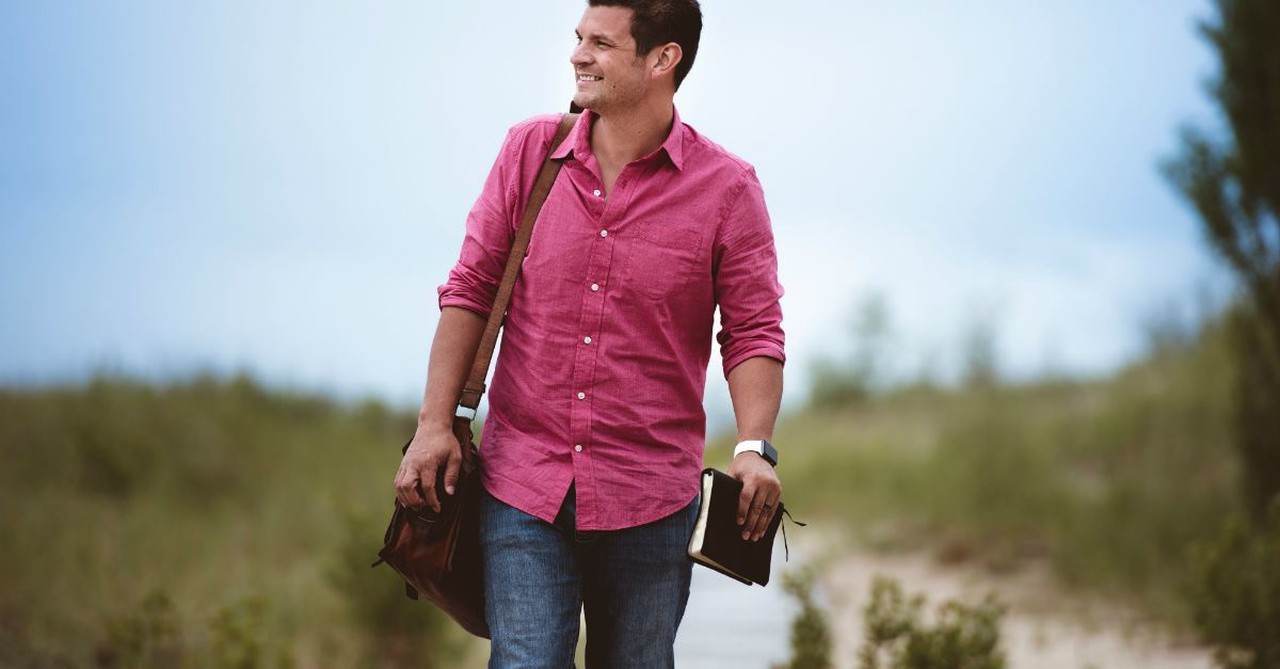9 Powerful Reasons Why "No" Is a Beautiful Word

As children, we do not like being told no. We believe that freedom is all about doing what we want, when we want, any way we want. We believe that this definition of freedom leads to the best life possible. What we don’t know is that declaring no can save our life!
“Hey, Mom, can I jump off the roof using my bedsheet as a parachute?”
“No!”
At that moment, the child asking the question feels disappointed. They think they are missing out on great fun. What they don’t realize is that Mom is protecting them from a broken leg or worse. The word no can save lives.
Here are 9 more reasons why no is a beautiful word:
Photo Credit: ©Unsplash / Isaiah Rustad
1. No can add life to your years.

1. No can add life to your years.
SLIDE 1 OF 10
“Would you like a slice of triple chocolate cake?”
Everything inside me screams, Yes! A big slice, and a nice scoop of vanilla ice cream on the side, please! My heart and my flesh want to say yes, but instead out of my mouth come the words, “No, thank you.”
What they don’t know is I am training for a triathlon, and I understand that this no, along with countless others, will impact my training and the outcome of the race. When I cross the finish line, there will be a sense of accomplishment that surpasses the momentary pleasure of a delicious dessert.
Saying no can add years to your life. And it can add life to your years.
No is a beautiful word. Maybe one of the most beautiful you will ever speak.
Photo Credit: ©Unsplash/Jenny Hill
2. No creates space, slows the pace, and saves face.

2. No creates space, slows the pace, and saves face.
SLIDE 2 OF 10
There is a freedom in saying no. No creates space, slows the pace, and saves face.
“Can you help out with the Girl Scout fundraiser?”
“You know, I believe in what you are doing, but right now I simply don’t have the time to help. I can give a donation, but I can’t be on the team that plans the fundraiser. I’m going to have to say no.”
Once you make it clear that you can’t invest time in weekly meetings for the next five months, you exhale a sigh of relief. You have retained your freedom. You won’t have to lose an evening each week, a loss you can’t afford at this time.
You know the feeling. Whenever you give a clear no, you feel a sense of peace. You’ve protected the joy level of your life. Because when a person is overextended, their joy evaporates, no matter how hard they try to protect it.
Photo Credit: ©Unsplash/Ben White
3. No can lead to joy after the pain.

3. No can lead to joy after the pain.
SLIDE 3 OF 10
But there is the hard reality as well. The moment you say no (even if you say it diplomatically and graciously) is always difficult.
No one finds joy looking into the eyes of an excited child and saying no. You don’t delight in disappointing someone who wants your help or your involvement in a project. It can be painful to look into the mirror and say no to your own desires.
But if no is the right answer, the result will open your schedule, grow your relationships, and bring peace to your soul. All of these things are gateways to a more joyful life.
Photo Credit: ©Unsplash/Nine Kopfer
4. God says no, so you can too.

4. God says no, so you can too.
SLIDE 4 OF 10
Sometimes God says no.
Let’s look at two examples. The first is silly and the other quite serious.
In the movie Bruce Almighty, Jim Carrey plays the title character, Bruce, who encounters God in the form of actor Morgan Freeman. God has decided to delegate his responsibilities to Bruce for a short period of time. As you can imagine, Bruce experiments with his unbounded power as he deals with an unending stream of prayer requests from billions of people around the globe.
In utter exasperation at the sheer number of requests, Bruce decides to hit the yes button and affirmatively answer every prayer request flooding his computer and his mind.
This would seem like a good idea, except thousands of people now win the lottery on the same day. They are expecting millions of dollars, but because the payout is split among all the winners, they end up with just enough money for a modest dinner out, leading to disappointment, riots, and mayhem. Behind this humorous scene is a serious point.
God is not really concerned with whether we win or lose the lottery. He says no on a daily basis to the self-centered barrage of requests we make for easy money without work or responsibility.
God is the wisest and most beautiful being in the universe, and he does what is best for us, even when we don’t understand why. He is far too loving to give in to self-centered prayers that cause more harm than good.
Photo Credit: ©Unsplash/Emmanuel Phaeton
5. Jesus shows us how saying no protects our focus.

5. Jesus shows us how saying no protects our focus.
SLIDE 5 OF 10
In
Suddenly, a man who is spiritually tormented begins shouting out questions and making wild statements. Jesus silences him and speaks to the demon terrorizing the man. The man convulses, screams, and is set free.
After the worship service, Jesus walks with friends to one of their homes, where a woman is sick with fever. Jesus goes back to work again. He shows love, care, and compassion by healing her.
That same evening, a massive crowd descends on the home where Jesus is staying. This leads to a spontaneous time of Jesus healing the sick and freeing those who are locked in spiritual bondage. Sickness is defeated and demons are sent running for the hills!
But let’s see how he later chooses no, to complete his mission to help us all.
Photo Credit: ©Unsplash/Austin-Ban
Then Jesus makes a positive decision.

Then Jesus makes a positive decision.
SLIDE 6 OF 10
Very early the next morning, Jesus wakes up and takes a walk. He finds a quiet place where he can talk with his heavenly Father, but some of his disciples track him down to let him know that there are people looking for him.
The disciples request that Jesus return to town and do more miracles and heal even more people.
Jesus says no.
He is crystal clear in his response.
Jesus knows there are still needs he could meet. He is profoundly aware that many will be disappointed if he does not come back.
But Jesus is committed to his mission. And his primary focus is not healing. He has come to be a teacher and a preacher. So, Jesus says to his disciples, “Let us go somewhere else—to the nearby villages—so I can preach there also. That is why I have come” (Mark 1:38, emphasis added).
His response to the request is clear, simple, and mission-driven. And it is an emphatic no. In his wisdom, Jesus—who is God in human form—says no to the urgent requests and needs of people so he can say yes to something greater, something better.
Photo Credit: ©Unsplash/Ben White
6. When God says no, there is a blessing in it.

6. When God says no, there is a blessing in it.
SLIDE 7 OF 10
When we look back on our lives, I believe, all of us will be thankful that God said no to some of our prayer requests. I dated a couple of nice girls before I met my wife, Sherry, and there were times when I asked God, “Could this be the woman I will spend the rest of my life with?” God said, “No!”
When I finally met my wife, I looked back and thanked God for his kind no. His no was preparing me for a better yes!
Jesus was “God with us” (Matt. 1:23). It was in his power to say yes to every request, yet there were times he said no. And if God says no, what does that teach us about the need for us to say no as well?
Take a moment to reflect on your life. Has God ever said no to something you wanted? Are you able to see wisdom in that no today?
If God says no, you can be confident that there are times when you need to say no too.
Photo Credit: ©Thinkstock/DigitalSkillet
7. Saying no isn’t negative, it’s positive!

7. Saying no isn’t negative, it’s positive!
SLIDE 8 OF 10
The word no is not about limiting ourselves; it is about setting ourselves free. It is not about what we won’t get to experience, purchase, or enjoy; it is about the exact opposite!
It is not about being cruel. It is often the kindest word we can speak.
When you utter a thoughtful and clear no, you are not being negative. You are actually being positive! It is time for you and me to become positively negative so we can live with freedom, peace, and productivity.
What is one no you can speak today that will make your life better?
Photo Credit: ©Pexels/Julian Jagtenberg
8. Saying no is a yes to something better.

8. Saying no is a yes to something better.
SLIDE 9 OF 10
The power of no is about learning to say no with strategic focus so you can say yes to the things that are most important and that hold the greatest value.
When your life is full and your margin limited, every time you say yes to one thing, something else falls off your plate. When you say yes, you are also saying no.
As you learn to utter your strategic nos, you are freed up to say yes in a way that will revolutionize your life.
Saying no can bring the greatest joy and value to your life. You must learn to say it and mean it.
God says no. You can too.
The most positive thing you might do today is say no.
Photo Credit: ©Pexels/Leigh Heasley
9. You can find comfort, freedom, and peace in your faithful no.

9. You can find comfort, freedom, and peace in your faithful no.
SLIDE 10 OF 10
Still have trouble saying no? Here’s an exercise for you to try:
Find a quiet and private place, maybe your bedroom, a bathroom, or your car. Practice saying no. Let it come out of your mouth, and allow your ears to hear your voice saying this powerful word. Say it at least thirty times.
You can vary the volume, change the tone, and even add “thank you.” You can practice saying it with a smile and with a firm gaze.
Get comfortable saying this word, because you will be saying it for the rest of your life.
This excerpt is adapted and used with permission from Kevin G. Harney’s book No is a Beautiful Word: Hope and Help for the Overcommitted and (Occasionally) Exhausted.
Kevin G. Harney (kevingharney.com) serves at Shoreline Community Church in Monterey, California. He is the author of many books and studies, including Organic Outreach for Ordinary People, Seismic Shifts, and Reckless Faith.
Photo Credit: ©Thinkstock/NiseriN
Originally published November 10, 2022.









